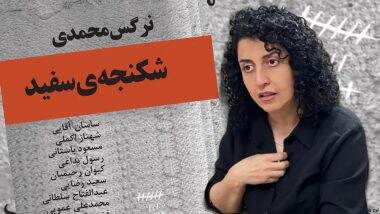Narges Mohammadi's book and documentary about the plight of imprisoned activists in Iran sheds light on human rights abuses suffered by those behind bars in the Islamic Republic."In Iran, a solitary cell is not like the isolation in Western prisons," explained Taghi Rahmani.
And Rahmani would know more than most. He is "Iran's most frequently jailed journalist," according to Reporters Without Borders.
Also Read | Latest News | CenturyPly Sets Revenue Target of Rs 12,000cr by 2031.
"In a solitary cell in Iran, you are locked up and have no communication or facilities. Not a meeting, not a book, not an essay ... with a blindfold and you only hear sounds," Rahmani told DW at a screening of the film "White Torture," which exposes the psychological torture methods imposed on political activists imprisoned in the Islamic Republic.
Documenting white torture
Rahmani's wife and fellow activist Narges Mohammadi has also endured several spells in prison over the last 25 years, due to the Islamic Republic's dim view of being scrutinized over its human rights record.
Mohammadi was first imprisoned for a year in 1998 for criticizing the Iranian government. She has been fighting against the regime ever since.
After other spells in prison, in May 2016, she was sentenced in Tehran to 16 years behind bars for establishing "a human rights movement that campaigns for the abolition of the death penalty."
Despite the best efforts of the regime, Mohammadi's voice could not be silenced. She began to document the suffering of fellow prisoners, eventually putting a series of interviews into the book "White Torture."
The documentary of the same name now sheds light on the harrowing treatment of political prisoners in solitary confinement.
White torture refers to a type of psychological torture technique that is used in Iran, in which prisoners are kept isolated for prolonged, indefinite periods of time, in a cell where everything is completely white.
Confessions by coercion
A recent screening of "White Torture" in Berlin, organized by human rights group Hawar, brought together rights advocates, former political prisoners and relatives of dual-national inmates currently in prison in Iran.
Mariam Claren, daughter of Nahid Taghavi, a political prisoner in Iran, said the film was "very difficult to watch" because of the "torture that can be seen." As Claren highlights, the Iranian authorities don't want you to watch it, as "White Torture" brings to light exactly what "cannot be seen."
In fact, there were some accounts that were too harrowing to be shown. "Solitary confinement is really a painful situation," says documentary creator Gelareh Kakavand. "Behind the scenes of this documentary, there were many emotions in the interviews that could not be recorded. I hope that the audience will get close to those feelings after watching this movie."
Covert operation
Much of the filming for the documentary was done in the interim periods between Mohammadi's penultimate and current spells behind bars. It was by no means an easy task. A covert operation to evade authorities was undertaken.
"The conditions of making the film were difficult," says filmmaker Vahid Zarezadeh, who has been forced to flee Iran after being interrogated and threatened for the work highlighting conditions in their country's prisons.
"In the first minutes of the film, the audience sees that one of the agents of the Ministry of Information called to Narges Mohammadi. We went unannounced to get some interviews. The whole group did not go to the filming location together. For example, Narges went separately, and we went separately. Even Narges used to ride a motorcycle so that the pursuers would lose her."
Now back in prison
Mohammad's plight continues, back behind bars for a fifth time since that first arrest in 1998.
In December 2022, amid the protests triggered by the death in custody of Jina Mahsa Amini, Mohammadi, in a report which was published by the BBC, detailed the sexual and physical abuse of detained women.
In January 2023, she gave a harrowing account from prison which detailed the condition of the women in Evin Prison, the primary site for the housing of Iran's political prisoners since 1972, including a list of 58 prisoners and the interrogation process and tortures they have gone through.
Edited by: Elizabeth Grenier
(The above story first appeared on LatestLY on Sep 27, 2023 07:20 PM IST. For more news and updates on politics, world, sports, entertainment and lifestyle, log on to our website latestly.com).













 Quickly
Quickly





















